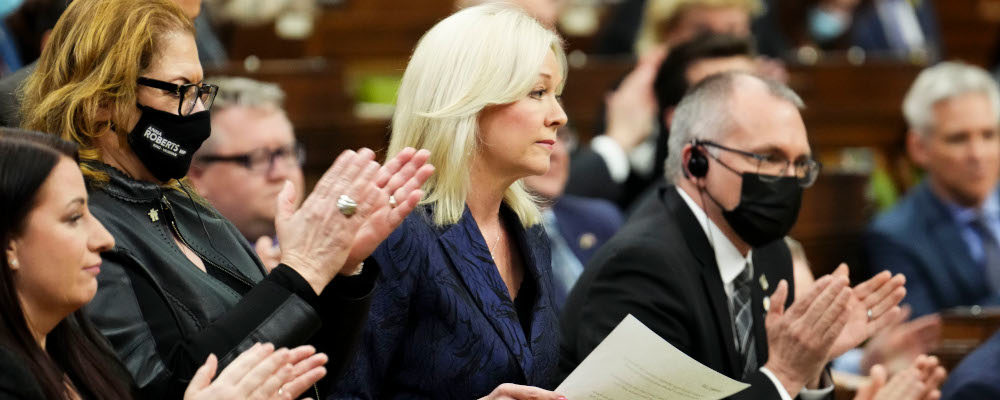In March 2005, the federal Conservative Party adopted a Policy Declaration recognizing the right of Conservative MPs to vote freely on “issues of moral conscience.”1Conservative Policy Declaration https://cpcassets.conservative.ca/wp-content/uploads/2020/10/15090948/9f7f204744e7480.pdf Although the policy was vague as to what constituted such an issue, it disqualified certain matters outright (“the budget, main estimates, and core government initiatives”) and offered limited examples of other matters (“abortion, the definition of marriage, and euthanasia.”) While it spoke about “issues” in the broad sense, it was not intended to be a broad policy. Indeed, there was little ambiguity as to its intended purpose, since the party adopted it amidst the fraught debate over the legalization of same-sex marriage.
Today, that debate is firmly over. Yet the policy remains on the books, and many Conservatives take pride in the protection of the freedom of conscience. Some see the policy as helping to make the Conservative Party a big tent—a place where people with different normative views of the world coexist. Others say that protecting the right to vote in accordance with one’s conscience elevates this right in practice, which bolsters Canadian democracy.
These claims, however, are misleading. A freedom of conscience narrowly extended only to a handful of prejudicially selected “issues”—to the exclusion of all other issues—is not much of a freedom of conscience at all. The Conservative Party’s Policy Declaration clearly states it does not apply to all issues. It has also been selectively applied in practice, too. A year after the party enacted it, MP Garth Turner was ejected for breaching caucus confidentiality and writing on his blog about environmental issues—no doubt matters he felt strongly about as issues of moral conscience. The party has also not hesitated to eject or condemn other MPs or candidates for offensive conduct which they would likely contend was based on their moral consciences. In other words, to borrow a quotation from Oscar Wilde, Conservatives identify what is and is not an “issue of moral conscience” the same way artists make art—by drawing a line somewhere.
This is why the policy is so problematic for the party. It was never about abstract conscience rights. It was about select issues—abortion, same-sex marriage, and euthanasia—and permitting elected Conservative politicians to take their own positions on them. Rather than admit so explicitly, the party wrapped this narrow free-voting privilege on specific issues in broad language about the freedom of conscience. It was a sham at the time, and today it is a poison pill for the party, for two reasons.
The first reason, and the most obvious one, is that most Canadians have strong consensus views on these issues. Support for same-sex marriage is overwhelming2LGBT+ Pride 2021 Global Survey points to increasingly positive attitudes in Canada toward LGBT+ individuals https://www.ipsos.com/en-ca/news-polls/global-survey-points-to-increasingly-positive-attitudes-in-canada-toward-lgbt-individuals and nearly 80 percent of Canadians believe the government should protect abortion rights.3Majority of Canadians say abortion should be left as is, without legal restrictions: poll https://nationalpost.com/news/canada/majority-of-canadians-say-abortion-should-be-left-as-is-without-legal-restrictions-poll A further 86 percent of Canadians support the Supreme Court of Canada’s decision in Carter v. Canada, which struck down the provision in the Criminal Code prohibiting assisted suicide.4Support for medically assisted dying in Canada https://www.ipsos.com/sites/default/files/ct/news/documents/2021-02/maid_in_canada-factum-2021-02-25-v1.pdf For a party accused of unhinged populism in op-eds on a regular basis, the Policy Declaration demonstrates the party’s predilection for tolerating very unpopular views.
The party and its recent leaders’ efforts to confront this reality without dismantling or revising the policy have been ham-fisted. For example, although article 10 of the Policy Declaration protects the right to a free vote on abortion, article 76 contradicts that and says: “A Conservative Government will not support any legislation to regulate abortion.” The party’s leadership also regularly promises never to “reopen” these issues. The result is a tangled mess of discrimination and doublespeak.
Most of the party, like the country itself, has evolved on these issues. In 2011, only a handful of Conservative MPs participated in an “It Gets Better” campaign to raise awareness of LGBT teen suicide. Today, things could not be more different. Between 2015 and 2021, the Conservative Party consistently castigated the Liberals for their inaction in overturning the discriminatory gay blood ban. Openly LGBT members of the party are regularly elected and moved into serious posts with utter nonchalance. MP Michelle Rempel Garner even sought to legalize poppers. And there is no shortage of statements from leading Conservative MPs that would have seemed foreign to the party when it was founded. MP Scott Aitchison wrote on the day of the vote to ban conversion therapy: “Today is one of the proudest days I’ve had in this place. Today, Parliament chose love over hate and fear.”
Unfortunately, these happy messages are not ones average Canadians are likely to hear. This brings us to the second reason why the policy is a poison pill. It has empowered certain MPs to air highly visible and unpopular views under the guise of speaking out on “issues of moral conscience.” Although this occurs primarily with radioactive topics like abortion and same-sex marriage, it has emboldened some Conservative politicians to champion other minority views, too.
In an overlap that is striking but hardly surprising, one sees a few frequent flyers in this club. For example, MP Dean Allison was a classic opponent of same-sex marriage on the basis of moral conscience. More recently, and once again acting on this basis, Allison gained national attention in the lead-up to the last federal election for hosting an online talk show that aired episodes on vaccine skepticism—contradicting the party’s messaging on vaccines. Allison also promoted ivermectin and filed spurious petitions about that drug in the House of Commons. In March, he posted a link to an “informative article” suggesting Justin Trudeau only revoked the Emergencies Act after a telephone call from World Economic Forum Executive Chairman Klaus Schwab.
To take another example, MP Ted Falk often made comments during the pandemic to the tune that “[n]obody should lose their job or be made to feel ‘less than’ because they chose not to be vaccinated or chose not to disclose on the grounds of privacy.” Fair point. That is until one observes that Falk went against his party in refusing even to stand for the historical apology to LGBT people who were fired by the federal government between the 1950s and 1990s for being LGBT.
Both Allison and Falk should have been disciplined for their conduct in these instances and brought into the party’s more popular line. MPs are not elected to be oracles of conscience. Most Canadians say their MP cannot be trusted.5Trust in Government: Canadians wary of politicians and their intentions https://angusreid.org/views-of-politicians/ Indeed, one wonders if most Canadians can even name their MP. In 2013, a survey in the U.K. revealed that 75 percent of citizens could not.6Three quarters of people ‘cannot name their local MP’ https://www.bbc.com/news/uk-politics-22555659 In the main, we vote for the party, not the person. Just as employees have duties towards their employers—doing their jobs, not causing disruptions in the workplace, and not defaming their employers—so do politicians elected under party banners have a duty to toe party lines.
For the party, the costs of disciplining these MPs are minimal, which makes it a mystery why the Conservative Party was so hesitant to do so with Allison and Falk. As Derek Sloan showed by eking out a miserable fifth-place finish in the last election (and as Garth Turner previously showed, too), no one seems to feel sympathy for these characters when they are disciplined. No one misses them when they are gone. After Roman Baber was ousted as an MPP by the Progressive Conservative Party of Ontario, Ontarians did not seem to care. They re-elected his party with a net gain of seven seats in the following election.
Compare that result with the track record of the federal Conservatives. Over the last two years, the Liberal government took unprecedented measures to curtail the civil liberties of Canadians. It restricted mobility domestically and internationally, seized property without due process, enacted emergency measures legislation on grounds it refused to disclose (and lied about it), and blocked from disclosure vital public information in unprecedented ways. Government backers made insinuations about “funding from abroad” for the Ottawa protests that were proven false. This occurred even as the Trudeau Foundation itself received more money in foreign donations than domestic donations in both 2020 and 2021 (based on access to information requests I filed in January.)
How did Canadians respond? Of course, by re-electing the Liberals. The problem, I argue, traces back to the Policy Declaration that gives cover to a few disreputable MPs to voice and hold inflexible views in the name of the freedom of conscience on a handful of prejudicially selected “issues.” The national media is always happy to amplify these voices. In the last election, they did just that. The resulting mess was nothing short of a communications fiasco for the Conservative Party.
This brings us to the final and most important point, elucidated in a recent enlightening piece here at The Hub in which strategist Dan Robertson outlined several key challenges to the federal Conservative Party’s electability. One of them—and the one Robertson identified as the “most vexing”—was tactical voting. Election after election, Robertson noted, other federal parties succeed in siphoning the votes of some 25 percent of Canadians who would consider voting Conservative but for their belief “the party has not made enough progress on social issues I care about.” The source of this information came from an internal exit survey of 10,000 Canadians following the 2021 election.
Sadly, wayward MPs within the party like Allison and Falk—not Trudeau or any other Liberal—remain the principal reason for scaring away those 25 percent of voters identified by Robertson. This is because, time and again, they prove themselves deeply out of step with the Canadian consensus by taking inflexible stances on prejudicially selected “issues” in the name of the freedom of conscience. Although this is popular with parts of the party’s base (like the 66 percent of evangelicals who feel that freedom of conscience is “becoming weaker”), it is less so for other Canadians (such as non-believers, only 18 percent of whom share the same sentiment.) If the Conservative Party ever wants to be entrusted with power again, it will have to convince that 25 percent of Canadians identified by Robertson to take a closer look.
To do so, the party must learn that the consciences of some Conservative politicians do not need protecting.




